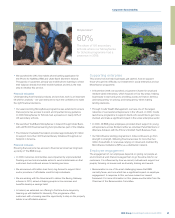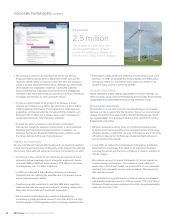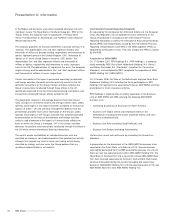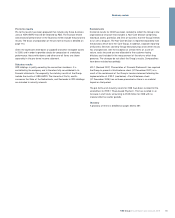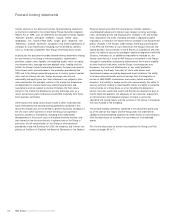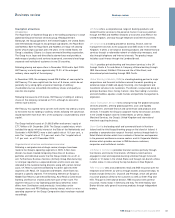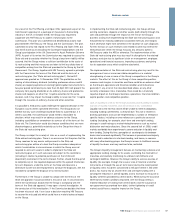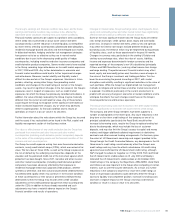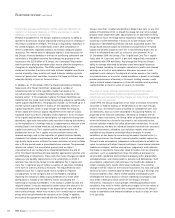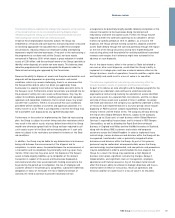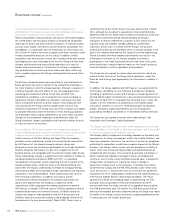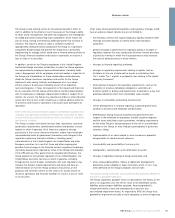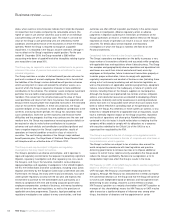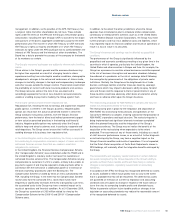RBS 2009 Annual Report Download - page 57
Download and view the complete annual report
Please find page 57 of the 2009 RBS annual report below. You can navigate through the pages in the report by either clicking on the pages listed below, or by using the keyword search tool below to find specific information within the annual report.
55RBS Group Annual Report and Accounts 2009
Business review
Risk factors
Set out below are certain risk factors which could affect the Group’s
future results and cause them to be materially different from expected
results. The Group’s results are also affected by competition and other
factors. The factors discussed in this report should not be regarded
as a complete and comprehensive statement of all potential risks
and uncertainties.
Risks relating to the company
The company and its UK bank subsidiaries may face the risk of full
nationalisation or other resolution procedures under the Banking Act.
Under the provisions of the Banking Act, substantial powers have been
granted to the Authorities as part of the Special Resolution Regime to
stabilise banks that are in financial difficulties (the “SRR”). The SRR
confers powers on the Bank of England: (i) to transfer to the private
sector all or part of the business of a UK incorporated institution with
permission to accept deposits pursuant to Part IV of the Financial
Services and Markets Act 2000 (FSMA) (a “relevant entity”); (ii) to
transfer all or part of the business of the relevant entity to a “bridge
bank” established by the Bank of England; and also confers a power on
HM Treasury to transfer into temporary public ownership
(nationalisation) the relevant entity or its UK-incorporated holding
company. The Banking Act also provides for two new insolvency and
administration procedures for relevant entities.
The purpose of the stabilisation options is to address the situation
where all or part of the business of a relevant entity has encountered, or
is likely to encounter, financial difficulties. Accordingly, the stabilisation
options may only be exercised if the FSA is satisfied that (i) a relevant
entity such as the company’s UK banking subsidiaries, including the
Royal Bank and NatWest, is failing, or is likely to fail, to satisfy the
threshold conditions set out in Schedule 6 to the FSMA, and (ii) having
regard to timing and other relevant circumstances, it is not reasonably
likely that (ignoring the stabilisation options) action will be taken that will
enable the relevant entity to satisfy those threshold conditions. The
threshold conditions are conditions which an FSA authorised institution
must satisfy in order to retain its FSA authorisation. They are relatively
wide-ranging and deal with most aspects of a relevant entity’s business,
including, but not limited to, minimum capital resource requirements. It is
therefore possible that the FSA may trigger one of the stabilisation
options before an application for an insolvency or administration order
could be made.
The stabilisation options may be exercised by means of powers to
transfer property, rights or liabilities of a relevant entity and shares and
other securities issued by a relevant entity. HM Treasury may also take
the parent company of a relevant entity (such as the company) into
temporary public ownership provided that certain conditions set out in
Section 82 of the Banking Act are met. Temporary public ownership is
effected by way of a share transfer order and can be actioned
irrespective of the financial condition of the parent company.
If HM Treasury makes the decision to take the company into temporary
public ownership, it may take various actions in relation to the
company’s securities without the consent of holders of the securities,
including (among other things):
•transferring the securities free from any contractual or legislative
restrictions on transfer;
•transferring the securities free from any trust, liability or
encumbrance;
•extinguishing any rights to acquire securities;
•delisting the securities;
•converting the securities into another form or class (including, for
example, into equity securities); or
•disapplying any termination or acceleration rights or events of default
under the terms of the securities which would be triggered by the
transfer.
Where HM Treasury has made a share transfer order in respect of
securities issued by the holding company of a relevant entity,
HM Treasury may make an order providing for the property, rights or
liabilities of the holding company or of any relevant entity in the holding
company group to be transferred and where such property is held on
trust, removing or altering the terms of such trust.
Accordingly, there can be no assurance that the taking of any such
actions would not adversely affect the rights of holders of securities
and/or adversely affect the price or value of their investment or that the
ability of the company to satisfy its obligations under contracts related
to securities would be unaffected. In such circumstances, such holders
may have a claim for compensation under one of the compensation
schemes currently existing under, or contemplated by, the Banking Act
if any action is taken in respect of securities (for the purposes of
determining an amount of compensation, an independent valuer must
disregard actual or potential financial assistance provided by the Bank
of England or HM Treasury). There can be no assurance that holders of
securities would thereby recover compensation promptly and/or equal to
any loss actually incurred.
If the company was taken into temporary public ownership and a partial
transfer of its or any relevant entity’s business was effected, or if a
relevant entity were made subject to the SRR and a partial transfer of its
business to another entity was effected, the transfer may directly affect
the company and/or its Group companies by creating, modifying or
cancelling their contractual arrangements with a view to ensuring the
provision of such services and facilities as are required to enable the
bridge bank or private sector purchaser to operate the transferred
business (or any part of it) effectively. For example, the transfer may
(among other things) (i) require the company or Group companies to
support and cooperate with the bridge bank or private sector purchaser,
(ii) cancel or modify contracts or arrangements between the company or
the transferred business and a Group company, or (iii) impose additional
obligations on the company under new or existing contracts. There can
be no assurance that the taking of any such actions would not
adversely affect the ability of the company to satisfy its obligations
under the issued securities or related contracts.


